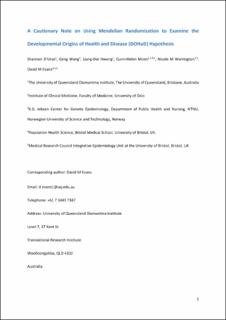| dc.contributor.author | D'Urso, Shannon | |
| dc.contributor.author | Wang, Geng | |
| dc.contributor.author | Hwang, Liang-Dar | |
| dc.contributor.author | Moen, Gunn-Helen | |
| dc.contributor.author | Warrington, Nicole Maree | |
| dc.contributor.author | Evans, David M. | |
| dc.date.accessioned | 2022-03-02T08:49:12Z | |
| dc.date.available | 2022-03-02T08:49:12Z | |
| dc.date.created | 2021-01-14T21:21:35Z | |
| dc.date.issued | 2020 | |
| dc.identifier.citation | Journal of Developmental Origins of Health and Disease. 2020, 1-6. | en_US |
| dc.identifier.issn | 2040-1744 | |
| dc.identifier.uri | https://hdl.handle.net/11250/2982311 | |
| dc.description.abstract | Recent studies have used Mendelian randomization (MR) to investigate the observational association between low birth weight (BW) and increased risk of cardiometabolic outcomes, specifically cardiovascular disease, glycemic traits, and type 2 diabetes (T2D), and inform on the validity of the Barker hypothesis. We used simulations to assess the validity of these previous MR studies, and to determine whether a better formulated model can be used in this context. Genetic and phenotypic data were simulated under a model of no direct causal effect of offspring BW on cardiometabolic outcomes and no effect of maternal genotype on offspring cardiometabolic risk through intrauterine mechanisms; where the observational relationship between BW and cardiometabolic risk was driven entirely by horizontal genetic pleiotropy in the offspring (i.e. offspring genetic variants affecting both BW and cardiometabolic disease simultaneously rather than a mechanism consistent with the Barker hypothesis). We investigated the performance of four commonly used MR analysis methods (weighted allele score MR (WAS-MR), inverse variance weighted MR (IVW-MR), weighted median MR (WM-MR), and MR-Egger) and a new approach, which tests the association between maternal genotypes related to offspring BW and offspring cardiometabolic risk after conditioning on offspring genotype at the same loci. We caution against using traditional MR analyses, which do not take into account the relationship between maternal and offspring genotypes, to assess the validity of the Barker hypothesis, as results are biased in favor of a causal relationship. In contrast, we recommend the aforementioned conditional analysis framework utilizing maternal and offspring genotypes as a valid test of not only the Barker hypothesis, but also to investigate hypotheses relating to the Developmental Origins of Health and Disease more broadly. | en_US |
| dc.language.iso | eng | en_US |
| dc.publisher | Cambridge University Press | en_US |
| dc.rights | Navngivelse 4.0 Internasjonal | * |
| dc.rights.uri | http://creativecommons.org/licenses/by/4.0/deed.no | * |
| dc.title | A cautionary note on using Mendelian randomization to examine the Barker hypothesis and Developmental Origins of Health and Disease (DOHaD) | en_US |
| dc.type | Journal article | en_US |
| dc.type | Peer reviewed | en_US |
| dc.description.version | submittedVersion | en_US |
| dc.source.pagenumber | 1-6 | en_US |
| dc.source.journal | Journal of Developmental Origins of Health and Disease | en_US |
| dc.identifier.doi | 10.1017/S2040174420001105 | |
| dc.identifier.cristin | 1871656 | |
| cristin.ispublished | true | |
| cristin.fulltext | preprint | |
| cristin.qualitycode | 1 | |

